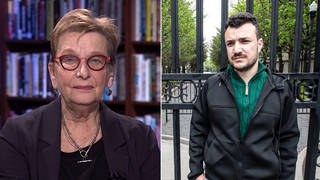
Census 2000 has confirmed what many have known for years: that the face of America is changing. The Latino andAsian-American populations are surging, and Latinos have pulled even with African-Americans, and will soon surpassthem as the largest minority group in the US.
In its first release of official figures last week, the Census Bureau put the Latino population at 35.5 million,while African-Americans number between 34.7 and 36.4 million, depending on whether one counts people who identifiedmulti-racial.
This means that the nation’s Hispanic population has jumped by nearly 60% since the last census was taken in 1990.
The Census Bureau has also revealed a soaring Asian-American population in several states. Direct, nationwidecomparisons with 1990 figures are not possible, since the new census allowed for 63 racial categories as opposed tofive. But New Jersey — a traditional destination for Asian immigrants — showed as much as a 94% gain over thedecade, while the Asian population in Pennsylvania could have grown by as much as 83%. Two states with relatively fewAsians still saw growth rates soar: the populations in Arkansas and South Dakota increased by over 100%. (TheCalifornia statistics have not yet been released.)
This points to another trend the census has revealed: the movement of people. Both Asian and Hispanic Americans aremoving outside of their traditional population centers in California, New York and Texas. And African-Americans aremoving south.
One of the direct consequences of the new figures will be redistricting: the new census data will be used to redrawcongressional, state, and local political district lines. The numbers are also used to parcel out over $185 billionin federal dollars among the states.
But will the increase in minority populations, and the redrawing of districts, translate into new, real politicalpower for Latinos, Asian and African-Americans? Many commentators have worried that the Latino population surge mayresult in competition with African-Americans rather than coalition-building. And in California, which boasts on ofthe largest minority populations in the country, the white establishment has found new ways to preserve itsprivileged status through statewide ballot measures. Finally, American women outnumber men by nearly 8 million, andby age 85, there are only 50 men for every 100 women. But men overwhelmingly dominate politics so even majoritystatus doesn’t always lead to political power.
Guests:
- Antonio C. Gonzalez, President of the William C. Velasquez Institute.
- Priya Sridharan, staff attorney at Asian American Legal Center.
- Jewelle Taylor Gibbs, author of the forthcoming book, ??Preserving Privilege: California Politics,Propositions, and People of Color and recently retired professor at UC Berkeley.











Media Options